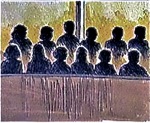Jurors
A jury is a sworn body of people convened to render an impartial verdict (a finding of fact on a question) officially submitted to them by a court, or to set a penalty or judgment. A trial in which a jury decides the verdict is a jury trial. A person who is serving on a jury is a juror.
Etymology
The word jur originates from the Latin jus (gen. juris), meaning "law". Juries are most common in common law adversarial-system jurisdictions. In the modern system, juries act as arbiters of fact, while judges act as arbiters of law. A trial without a jury (in which both questions of fact and questions of law are decided by a judge) is known as a bench trial.
Types of jury
The petit jury (or trial jury) hears the evidence in a trial as presented by both the plaintiff (petitioner) and the defendant (respondent). After hearing the evidence and often jury instructions from the judge, the group retires for deliberation, to consider a verdict. The majority required for a verdict varies. In some cases it must be unanimous, while in other jurisdictions it may be a majority or supermajority. A jury that is unable to come to a verdict is referred to as a hung jury.
The size of the jury varies; in criminal cases there are usually 12 jurors, although Scotland uses 15. In civil cases many trials require only six. A grand jury, a type of jury now confined almost exclusively to some jurisdictions in the United States, determines whether there is enough evidence for a criminal trial to go forward. Grand juries carry out this duty by examining evidence presented to them by a prosecutor and issuing indictments, or by investigating alleged crimes and issuing presentments. A grand jury is traditionally larger than and distinguishable from the petit jury used during a trial, with at least 12 jurors.
Composition of juries
Serving on a jury is normally compulsory for those individuals who are qualified for jury service. Since a jury is intended to be an impartial panel capable of reaching a verdict, there are often procedures and requirements, for instance, fluent understanding of the language, or the ability to test jurors or otherwise exclude jurors who might be perceived as less than neutral or more partial to hear one side or the other. Juries are initially chosen randomly from the eligible population residing in the court's jurisdictional area (unless a change of venue has occurred). Jury selection varies widely; in the United States, some form of organized questioning of the prospective jurors (jury pool) occurs—voir dire—before the jury is selected (impaneled). A head juror is called the foreman or presiding juror. The foreman is often chosen before the trial begins or upon the beginning of deliberations. The role of the foreman is to ask questions on behalf of the jury, facilitate jury discussions, and sometimes to read the verdict of the jury. Since there is always the possibility of jurors not completing the trial for health or other reasons, often one or more alternate jurors are nominated. Alternates hear the trial but do not take part in deciding the verdict unless a juror is unable to deliberate.[1]
